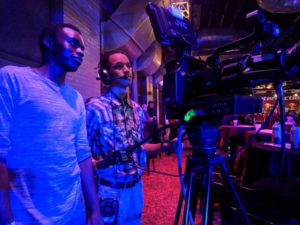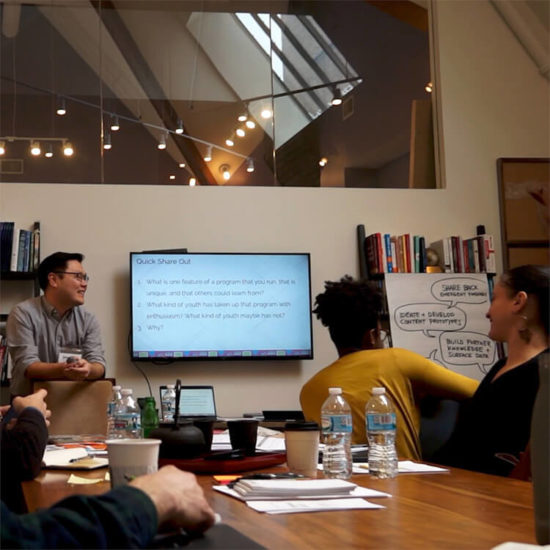How We Got Here
Why digital learning? Susan Crown reflects on the road that led to the foundation's investment in understanding community-based technology programs. Starting from the organization's central question of how to best equip the rising generation to thrive in a world changing at warp speed, she shares what new technological changes have meant for the work of the Susan Crown Exchange.
For the past decade, the Susan Crown Exchange has focused on one single question: how do we best equip the rising generation to thrive in a world changing at warp speed?
It is cliché—and also true—to observe that the “digitization of everything” has altered how we communicate, learn, present ourselves and interact with the world. Neurologists, social scientists and educators are scrambling to comprehend how powerful technology tools have impacted the course of human history; how they affect human interactions and emotions, how we relate to one another, what this means for the workforce and the economy, on and on.
The struggle to balance our choices with our new capabilities is not a new phenomenon. We can draw parallels. Advances in medical technology have far outpaced our capacity to allocate (and pay for) cutting edge treatments. Our legal system isn’t evolving fast enough to address the issues and complexities of intellectual property. And in the same way, we do not yet know how to best put technology to perfect, positive use. Nor do we fully grasp some of the negative and unintended consequences it reaps. Young digital natives are our test case.
It’s a foregone conclusion that digital natives will be running the world in a few decades, so it behooves us to unpack, analyze and better understand what it means to grow up in a digital world.
The digital revolution has changed the world in one more very important way: it has both shortened and lengthened the boundaries of our world and sense of interconnectedness. We are now knit together globally. We can connect with people (almost) anywh ere on earth simply by picking up our phones, or by using a keyboard and screen. Events, information, news, even gossip is instantly available. We are deluged with incoming data 24/7, some of it true, some of it fake, lots of it entertaining.These represent an unprecedented set of changes. We are working hard to understand their implications, particularly as they relate to youth.
ere on earth simply by picking up our phones, or by using a keyboard and screen. Events, information, news, even gossip is instantly available. We are deluged with incoming data 24/7, some of it true, some of it fake, lots of it entertaining.These represent an unprecedented set of changes. We are working hard to understand their implications, particularly as they relate to youth.
We know that technology is included in the toolbox of development, but tech tools have to be placed properly and firmly in the context of human interaction.
To this end, in our ‘Exchange Model’ of funding where we bring together leading organizations to synthesize best practices, we studied some of the best youth programs in the country—unpacking how they integrate digital media into their programming and practices. We focused (as we always do) on programs where kids vote with their feet; afterschool, non-mandatory programs. After issuing a national, highly competitive RFP, we identified eight exceptional organizations helping youth evolve into secure, capable, contributing adults through afterschool programs where they engage with technology.
We understood that there are both digital skills and digital fluencies that position youth strongly to enter and prosper in the 21st century workforce; we wanted to be able to specifically name those skills.
One thing that surfaced over an 18-month period of working with top-tier digital learning programs is that the key to success in this new world is what Carol Dweck calls “growth mindset”, the disposition, propensity, capacity and willingness to adapt to new information and new ways of doing things. Adaptability rose to the top of our tech skills list.
Advances in tech are occurring fast and furiously, meaning that jobs will quickly evolve into newer, different jobs, and our historical practice of teaching repetition and a static skillset is no longer relevant.
The programs we selected to teach us about the best in digital learning were all of top quality, but varied widely in their programmatic approach. Some promoted creativity and arts, others the use of technology to address chronic community challenges, still others were specifically focused on pure technology skills like coding or preparing kids for IT work.
As is our practice, we gathered knowledgeable and experienced leaders in the field to help us seek answers. These exemplary youth-serving digital learning programs shared their work, offering up their models for careful analysis and study by peers and a first-rate team of researchers from New York University and University of California, Irvine, both known to produce America’s leading scholars in the domain of ‘youth and technology.’
 The Reclaiming Digital Futures toolkit is a reflection of what we learned. Our goal is to share those lessons, spur ideas, and possibly offer some models and considerations about how to use digital media to ignite the hearts, minds and souls of youth.
The Reclaiming Digital Futures toolkit is a reflection of what we learned. Our goal is to share those lessons, spur ideas, and possibly offer some models and considerations about how to use digital media to ignite the hearts, minds and souls of youth.
One thing we know for sure; kids with a sense of purpose, a sense of competence, and a sense of community fare much better in life than kids who lack these three things. Technology offers remarkable new ways to bring these out in kids.
We owe great thanks to our partner organizations, who dedicated considerable time, effort, imagination, open-mindedness, keen intelligence, years of experience and real commitment to this work. It was gratifying to learn how they valued the opportunity to step back from their day to day work and/or financial “survival mode” to deeply examine what they do, how they go about their work. It is noteworthy that they considered the time to truly reflect on their work a luxury. Several of our partners referred to participation in the learning collaborative as an opportunity for “spacious thinking,” and described the experience as opportunity to think both more broadly and deeply about their work, prompting articulation to share with the larger community and also seeding insights as to how to do even more, better.
We also thank the scholars at New York University and University of California, Irvine for their deep investment in this endeavor. They skillfully organized and facilitated our convenings to maximize what we could learn. They fostered genuine collegiality and demonstrated the respect that these youth-service professionals deserve.
All of our partners are passionate about doing all they can to cultivate solid, competent, thoughtful 21st century citizens. This calling, we believe, could not be a higher priority.

Susan Crown
Chairman & Founder, SCE